P4G Head of Partnerships Participates in Ride Across Europe to Increase Awareness about Unity for Climate Action
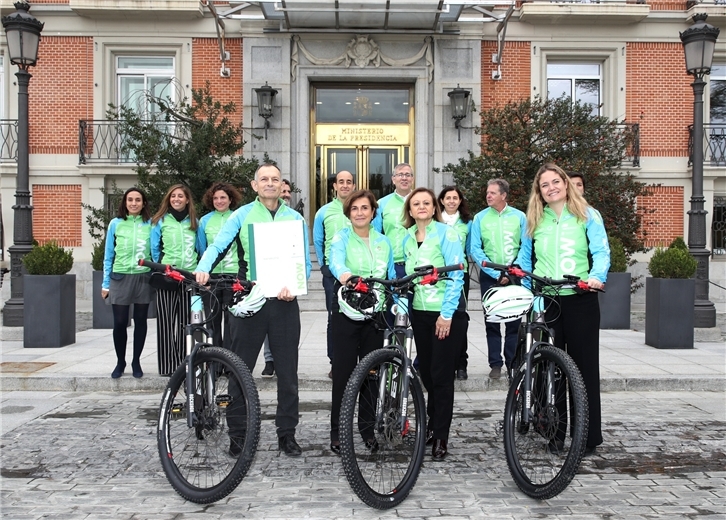
Publication Date
2018-12-07
About
KATOWICE – December 2, 2018 -- Robyn McGuckin, P4G Head of Partnerships, cycled more than 400 kilometers last week as a member of the Moving for Climate NOW ride from Vienna to Katowice. For three of eleven days, she joined a team of more than 40 experts from across the world whose work is dedicated to urgency and unity in the global fight against climate change.
In its third year, Moving for Climate NOW aims to emphasize and extend the global agreements set forth at COP21 in Paris, in 2015. Through its progression through Europe’s rolling hills and diverse states, the ride symbolically emphasized that no one government or organization can lead the fight towards a more sustainable future. Rather, the riders and the route in concert underscored the cooperation necessary to successfully take on the world’s most pressing environmental challenges.
Upon the riders’ completion of their ride at the COP24 conference, they delivered their manifesto to the United Nations Executive Secretariat for Climate Change. The document focuses on the Talanoa Dialogue, a space for conversation designed to encourage the participation of governments and civil society, with the aim of taking stock of the join work carried out so far to achieve global climate objectives. [Read More]
McGuckin’s participation in Moving for Climate NOW acknowledged P4G’s special alignment with the team’s manifesto. P4G’s mission of becoming the world’s leading forum for public-private partnerships innovating to achieve the objectives of key sustainable development goals only further emphasized the team’s intention of emphasizing collective, international and cross-sectoral action.
To learn more about the ride and watch video summaries of each day, visit the Moving for Climate NOW website.
P4G Meets with Government Leaders in Bangladesh and Indonesia
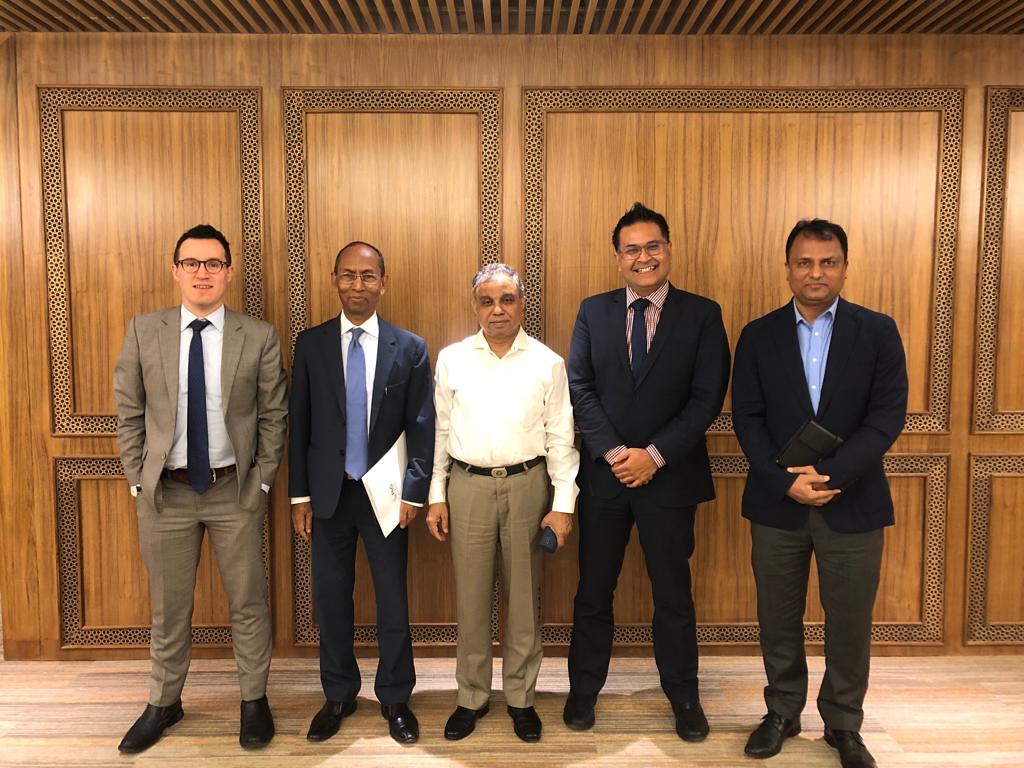
Publication Date
2019-08-28
About
P4G Global Director Ian de Cruz and Engagement Manger Daniel Mejia visited Indonesia and Bangladesh last month, where they met with representatives from existing partnerships, government and business leaders. There is a strong alignment of P4G agenda with Indonesian government priorities regarding sustainable development. Both sides expressed interests in renewable energy, electric buses and waste management. P4G also met with Food Loss and Waste Partnership, one of its 2018 Start-Up partnerships, to identify ways in which the P4G network can connect the partnership to opportunities for continued/future growth.
In Bangladesh, P4G attended a stakeholder workshop that was held at the Ministry of Foreign Affairs and moderated by a P4G champion – DG Mohammad Khorshed A. Khastagir. With more than 50 representatives from across the government, private and civil society sectors in Bangladesh, the workshop was a critical moment for increasing understanding about how partnerships can enable action on economic and climate commitments. Ultimately, the connections made at this event helped curate a strong relationship between P4G and Bangladeshi changemakers.
P4G looks forward to further sowing its relationships with both countries and helping to put partnerships at the core of their strategic approaches to environmental, social and economic growth.
P4G Partnerships to Participate in High-level Workshops to Accelerate Green Growth
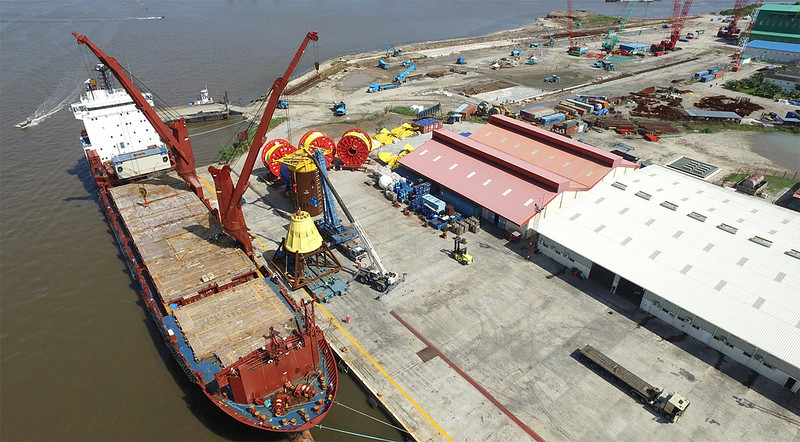
Publication Date
2019-07-05
About
On the sidelines of the UN Climate Change Summit this September, P4G will host three partnerships – The Zero Emission Bus Rapid-deployment Accelerator, Africa GreenCo and Sustainable Special Economic Zones – at acceleration workshops. The sessions will include 15-20 high level, business- and investor-focused participants, who will work with representatives from each partnership explore new strategies to fund, design and structure regional markets around the partnerships’ respective geographies and sustainable development focus areas.
The three partnerships chosen not only represent innovative solutions to the green economy, but also exemplify the P4G Way: a purpose-driven approach to success made possible through collaboration, story-sharing and trust. These partnerships' alignment with and buy-in to P4G's objectives have enabled early success: through on-the-ground action that is delivering upon promised solutions; buy-in from other investors, further guaranteeing their business model; and/or documented interest from potential future adopters of their approach. These milestones, in concert with P4G acceleration activities such as cross-sector engagement opportunities and events, has enabled these partnerships to come to life.
All three pose innovative solutions to different aspects that would contribute to a more sustainable economy – for instance, through the deployment of electric vehicles in cities across an entire region; through accessing one of the world’s readiest markets – renewable electricity access and provision in sub-Saharan Africa; or through the development of a model for sustainable special economic zones. Each has the potential to be scaled regionally and across the world. Learn more about these partnerships below:
The Zero Emission Bus Rapid-deployment Accelerator (ZEBRA)
Focused in Mexico City, Mexico, São Paulo, Brazil and Medellín, Colombia, this partnership is increasing each city’s adoption and deployment of electric buses across their respective public transit systems. And as this approach gains traction, the partnership will use Latin America as a laboratory for successful electric vehicle deployment in the public sphere. Ultimately, upon successful, initial implementation, cities worldwide will model this investment and deployment example for electric vehicles, sparking the evolution of an entire industry.
Through Africa GreenCo’s position as a regional credit-worthy intermediary off-taker and power services provider in Zambia, the partnership reduces the credit risk for power suppliers looking to sell in the region while also making energy more affordable for governments – and thus individuals – to purchase. And with energy sources including wind, solar and geothermal rife across the sub-Saharan region, success and investment in Zambia could quickly escalate to demand in countries including South Africa, Kenya, Ethiopia and others. The Africa GreenCo model, then, not only offers a practical solution; but also, an inspiring story for other nations, partnerships and businesses to replicate.
Sustainable Special Economic Zones (SSEZ)
The Sustainable Special Economic Zones aims to implement more environmentally- and socially- oriented practices and procedures in free-zone industrial parks across Africa. The partnership pilot, operating out of Lagos Deep Offshore Logistics Base (LADOL) in Nigeria, is the first of its kind – promoting human rights, social benefits and curbing the environmental impact of industrial production, while aiming to extend economic growth and job creation beyond the enclave of the zone. Building upon successes at LADOL, the partnerships is seeking ways to share its story to gain the level of commercial investment and political buy-in that could help replicate their model in special economic zones and industrial parks across the world.
Each of these three partnerships presents examples of projects on the cusp of creating replicable and scalable change. As P4G Partnerships at the center of the acceleration workshops, these projects will provide the best examples of what it means to be engaged with P4G. Later this year, as we prepare to announce our 2019 cohort as well as plans for future funding applications periods, we will bring our envisioned value-add to fruition and prove that our “way” is the foundation for concrete outcomes, signifying a path to positive global change.We look forward to sharing more about how our continued close alignment will serve the recognition and adoption of partnership-driven approaches for green growth challenges globally.
P4G receives 383 Partnership Applications

Publication Date
2019-03-11
About
The 2019 global call for partnerships ended on 15 February and resulted in 382 applications with projects in 73 developing and emerging countries that qualify for P4G funding. P4G, along with outside experts, will evaluate the proposals for impact, innovation, growth potential, implementation viability, and the value that P4G support can add. Finalists will be notified by early May. P4G will announce its start-up partnerships, those selected to receive US$100,000, on August 6. P4G Scale-up Partnerships, which are eligible to receive up to US$1 million in funding, will be announced on September 17, shortly before the start of the UN Climate Summit on September 23. Learn more about all P4G Partnerships.
Editor's Note: A previous version of this article cited 383 applications instead of 382.
A Partnership-driven Approach in Bangladesh and Indonesia
Publication Date
2019-07-05
About
In late July, P4G Global Director Ian de Cruz and Engagement Manager Daniel Mejia will meet with business and government leaders in Bangladesh in Indonesia to discuss the opportunity for public-private partnerships to deliver on these countries’ respective green growth agendas and contribute to growth and leadership on national and international scales.
For both countries, the effects of climate change are beginning to appear suddenly and with great force. According to a 2018 report by the Journal on Nature and Climate Change, almost 200,000 reluctant farmers in Bangladesh may be forced to migrate due to coastal flooding. In Indonesia, where 50-60 million people depend directly on the landscape for their livelihoods, tropical forests and peatlands continue to remain under threat of logging and agricultural expansion. This is critical not only for the local populations, but also for carbon storage – integral to the world’s efforts to combat climate change.
Both countries, signatories of the Paris Agreement, have committed their course to ambitious growth and development plans: with Bangladesh specially focused on the power, transport and industry sectors, and Indonesia on land use, waste management and energy. While these commitments are important steps forward in terms of climate change mitigation and adaptation, they also instigate societal shifts towards more inclusive systems that will improve the health, well-being, economic stability and overall empowerment of everyday citizens. The ability to successfully incorporate this spectrum of potential in partnership-driven solutions is the core motivator behind P4G's collaboration with these countries.
“Our meetings with leaders in Bangladesh and Indonesia will be essential to further understanding how P4G can connect decision-makers across sectors to underscore and support an internationally-recognized approach to green, inclusive growth,” said de Cruz. “We see great potential in the projects and ideas we've encountered through P4G partnership applications and look forward to learning about the ways in which the P4G network can further expand to and work with our connections to accelerate sustainable and forward-thinking solutions.”
Already, the Indonesia Food Loss and Waste Action Partnership, a 2018 P4G Start-Up project, is aimed at cutting food loss and waste in country by 50% by 2030. Additionally, several applicants to P4G’s 2019 Partnership fund pose solutions for focus sectors in both countries, respectively. In August and September 2019, P4G will announce its start-up and scale-up selections – continuing to forge ahead on a partnership-driven approach to green growth worldwide.
Partnerships at Davos 2019
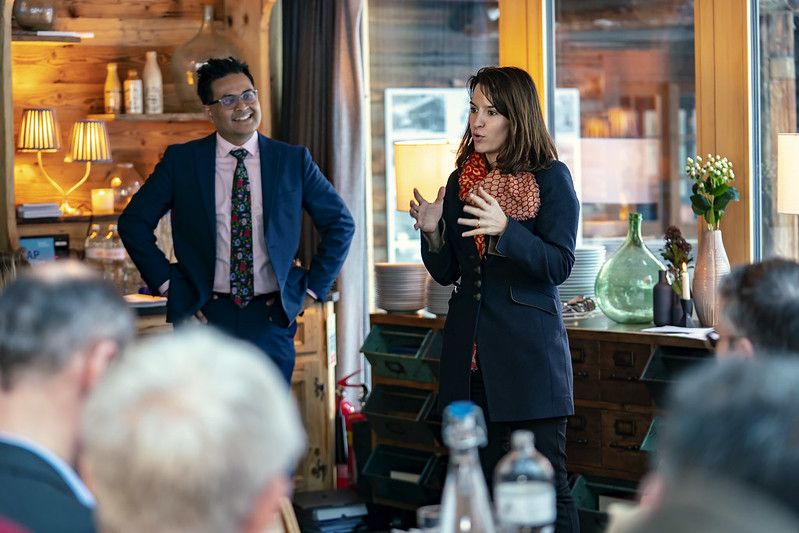
Publication Date
2019-01-08
About
At the World Economic Forum in Davos this month, a number of P4G Partnerships will have opportunities to discuss their projects with business and government leaders.
On January 22, SAP and the Islamic Development Bank have invited P4G to present at a luncheon on “The Agenda for Partnerships to Achieve the SDGs: From smart cities to driving success in electric mobility and clean energy access.” P4G Global Director Ian de Cruz will provide an overview of P4G while the CEO of Africa GreenCo Ana Hajduka will share their plans to bring renewable energy to Zambia and other countries in Sub-Saharan Africa. P4G will also share details of the Zero Emission Bus Rapid-deployment Accelerator in Latin America. Project Everyone, a group of communications and campaign experts working to promote the Global Goals, is also supporting the event.
On January 23, P4G will be highlighted at the breakfast launch of the Citizens Agenda for Clean Air and all the Global Goals. Koen The, CEO of Lendahand, a social impact investing organization, will speak on behalf P4G’s Energise Africa partnership. They will be joining a small group of high-profile speakers committed to empowering and supporting a global citizens’ movement to act upon clean air and other human rights.
P4G’s Indonesia Food Loss and Waste Action Partnership will be featured at another Davos event, about which more information will soon be provided.
About P4G
P4G – Partnering for Green Growth and the Global Goals 2030 – is a new initiative with the ambition of becoming the world’s leading forum for developing concrete public-private partnerships at scale to deliver on the SDGs and the Paris Climate Agreement. The government of Denmark provides funding for P4G. Besides the partner countries, non-profit organizations such as the Global Green Growth Institute, C40 Cities, World Economic Forum, and the World Resources Institute (which hosts the P4G Global Hub) are also P4G partners.
Thirteen Partnerships Granted P4G Start-Up Funding to Support Green Growth in Developing Countries
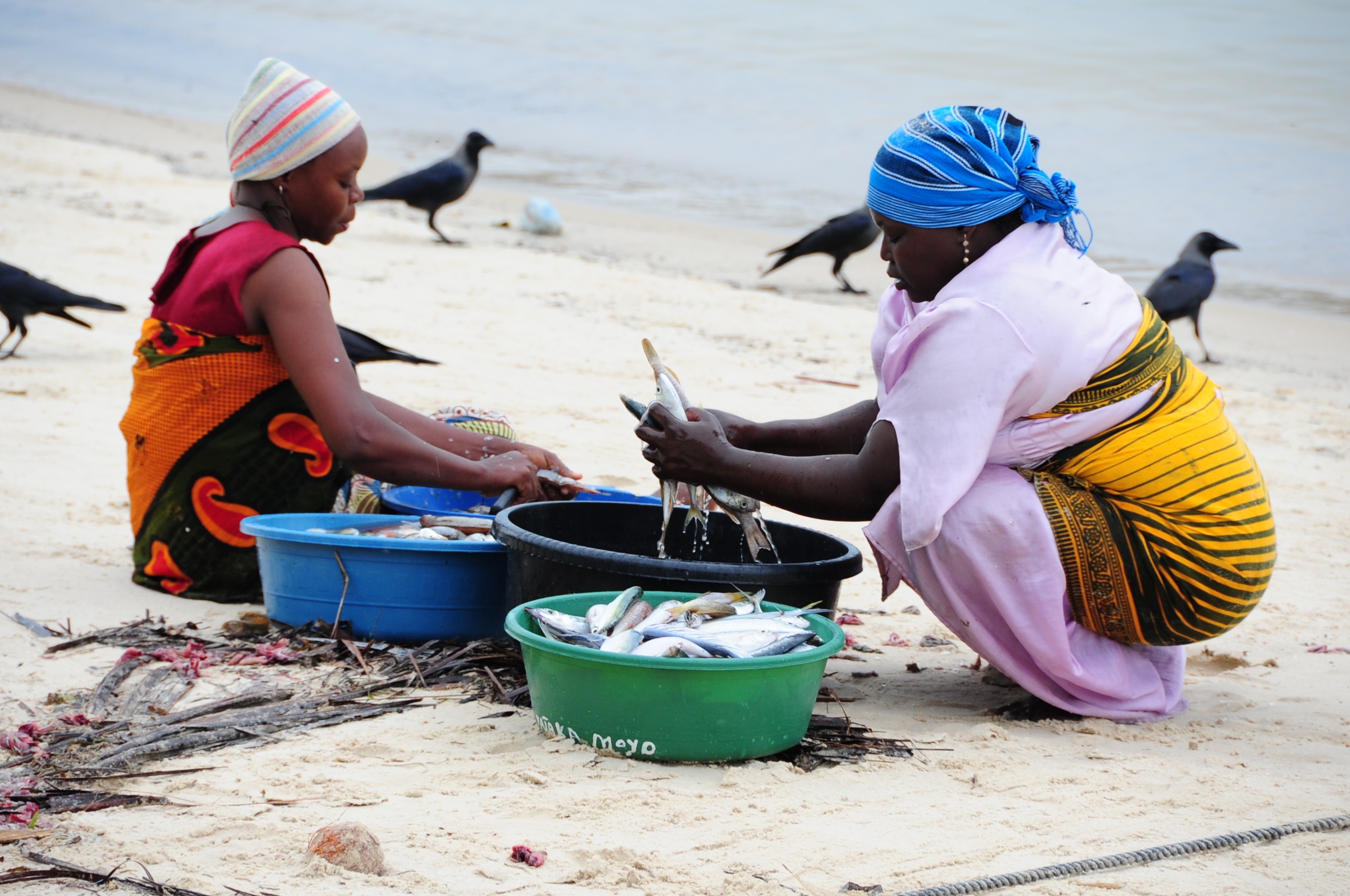
Subject
P4G Partnerships
Publication Date
2019-08-06
About
NEWS RELEASE
P4G Contact: Kate Danielsen, Communications Specialist, kate.danielsen@p4gpartnerships.org
WASHINGTON DC—August 6, 2019—P4G, the Partnering for Green Growth and the Global Goals 2030 Initiative, today announced 13 public-private partnerships to receive start-up funding for projects in five Sustainable Development Goal areas—food and agriculture, water, energy, cities and circular economy. These 2019 P4G Partnerships will receive up to USD 100,000 funding to improve the viability and scalability of their innovations in these key sustainable development areas.
The opportunity for climate action is clear: last year, New Climate Economy reported that cleaner, climate-smart growth could deliver over USD 26 trillion in economic benefits through 2030, as compared to business-as-usual. With this potential as a driving factor, P4G partnerships make innovative solutions for social and environmental progress possible. By bringing together a network of visionary leaders in government, business and civil society, the P4G Initiative enables these solutions to duplicate and scale in economies and geographies across the world.
In 2018, P4G’s first year, the Initiative funded 11 start-up partnerships – some of which are beginning to report on their progress, with good results. Their diverse approaches to a greener economy – including models for reducing food loss and waste in Indonesia; impact investing for renewable energy access in Kenya; and a marketplace for the re-use of industrial materials in Vietnam – have played a crucial role in creating engaged networks around thematic areas that P4G’s 2019 start-up partnerships bring to the fore.
The 2019 P4G Start-up Partnerships are clustered in areas such as clean energy access finance models, minimizing food loss and waste, a sustainable plastics economy and zero- or low- emissions transportation. Across the SDGs, P4G funded two projects each for SDG 2 in food and agriculture, SDG 11 in sustainable cities and SDG 12 in responsible consumption and production; three in SDG 6 for clean water and sanitation; and four for SDG 7 in affordable and clean energy. Many of the projects are also based in P4G partner countries—including Colombia, Ethiopia, Kenya, Mexico and Vietnam.
P4G Global Director Ian de Cruz commented, “We are pleased with how these partnerships build on the early successes we have seen with our 2018 start-up partnerships. Beyond their potential to implement and scale, many of these projects could become the P4G Scale-up Partnerships of tomorrow. Now in our second year, we have nearly three dozen partnerships underway in developing countries, creating a learning laboratory of sustainable solutions to drive inclusive growth, implement sustainable development goals and act on climate change. We look forward to working with these partnerships both individually and collectively, using the emerging partnership themes to build strong networks of keen investors, business leaders and government changemakers for a more sustainable, inclusive future.”
Learn more about the 2019 P4G Start-Up Partnerships below:
SDG 2 | Food Security/Sustainable Agriculture
Sustainable Technology for Tackling Extensive Food Loss in Kenya
Partners: World Wide Fund for Nature - Kenya (WWF-Kenya) and M-PAYG
Focal Country: Kenya
In Kenya’s costal fishing regions, it is estimated that nearly a third of all seafood is lost post-harvest due to a lack of access to cold storage. By drawing on World Wide Fund for Nature – Kenya’s experience with natural resource management and the expertise of Danish clean energy company M-PAYG, this partnership will provide these fishing communities with affordable off-grid solar-powered cooling appliances. This solution reduces the environmental impact of overfishing and provides food and income security for these fishing communities.
Smallholder Solar Pump Alliance
Partners: TechnoServe, Inc., Green Way Farms, HelloSolar International, SunCulture and Ethiopian Solar Energy Development Association (ESEDA)
Focal Country: Ethiopia
Only five percent of arable land in Ethiopia is equipped for irrigation, even though these systems enable better agricultural productivity, higher incomes, more jobs and improved nutrition. This disparity has spurred the Ethiopian government to prioritize irrigation expansion, powered especially by conventional fuel pumps. The Smallholder Solar Pump Alliance will guide the transformation of this nascent, burgeoning market by building a financially sustainable and scalable system to power irrigation with solar pumps, rather than conventional diesel ones – improving the ways water is used and accessed on the national scale.
SDG 6 | Clean Water and Sanitation
Ethiopian Beverage Alliance for Water
Partners: Nestlé Waters Ethiopia, Coca-Cola Beverage Africa, 2030 Water Resources Group and
Ethiopian Bottled Water and Soft Drink Manufacturing Industries Association (EBSMIA)
Focal Country: Ethiopia
Millions of Ethiopians lack access to clean water. This problem is made worse by poor water resources management and strife between communities and businesses battling for the same water sources. This partnership aims to approach these challenges by establishing an alliance between major beverage providers in the country. The alliance will develop a roadmap for increased water-use efficiency and accountability for more sustainable practices across the sector.
uMngeni Ecological Infrastructure Partnership
Partners: Duzi Umngeni Conservation Trust, Sappi, South African National Biodiversity Institute and Conservation Outcomes
Focal Country: South Africa
The uMngeni Ecological Infrastructure Partnership focuses on improving water governance, knowledge and effective collaboration between businesses and governments within the KwaZulu-Natal province in South Africa. This region -- home to more than 10 million people – often experiences flooding and water purity crises. This region -- home to some 10 million people – often experiences flooding and water purity crises. The partnership aims to help save money on current and future costs of flood mitigation and water purification, reduce flooding events, improve water quality and security and support economic growth.
BRAC and Hydro Industries; Clean water for all
Partners: BRAC and Hydro Industries Limited
Focal Country: Bangladesh
In the southwestern coastal region of Bangladesh, harmful microbes and contaminants including arsenic, iron, manganese and chloride pollute both ground and surface water. This partnership will develop an inclusive service delivery model that delivers safe water, at high volumes and affordable prices in formerly neglected and hard-to-reach communities in Bangladesh.
SDG 7 | Affordable and Clean Energy for All
Solar Cow 4 Impact Partnership
Partners: YOLK and Energy 4 Impact
Focus Country: Kenya
It is estimated that about 40 percent of Kenyans live in rural areas lacking access to reliable energy – an indicator that also illustrates social and economic wellbeing. The Solar Cow 4 Impact Partnership provides an innovative solution to bring solar power to these rural communities while also providing better opportunity for children to receive an education. Solar Cow 4 Impact partners with schools across Kenya to install solar systems that charge portable batteries distributed to families in off-grid communities. Families in need of electricity send children to charge the batteries at school – encouraging them to attend lessons in formal classrooms.
Green 4 Access First Loss Facility
Partners: GreenMax Capital Group and Energy 4 Impact
Focal Region: Sub-Saharan Africa
Capital investment is critical to achieving affordable and sustainable energy for all. However, these investments have not reached their full potential due to the perception of high risk. To catalyze investment, the Green 4 Access First Loss Facility partnership will seek to partner with major development finance institutions and impact investors to create a First Loss Facility to encourage upscaling investment in off grid energy solutions in Africa.
Partners: BSR (Business for Social Responsibility) and Green Freight Asia
Focal Country: Vietnam
In Hanoi, transport is responsible for 70% of the city’s air pollution. As Vietnam’s economy grows, so does its road freight sector and the associated impacts on climate and air quality. Vietnam’s trucks are mostly older and operate with sub-optimal fuel efficiency, accounting for disproportionately high volumes of transport-related emissions and pollutants. Led by BSR and Green Freight Asia, this partnership will launch a set of incentives for green freight certification to motivate Vietnam’s trucking companies to adopt eco-friendly practices and improve fuel efficiency, contributing both to their bottom line and to cleaner air and lower greenhouse gas emissions from the country’s trucking sector.
Electric Mobility Partnership for Colombia
Partners: Ambientronika Ltda, Findeter, Sodinlec Ltda and Fondo Acción
Focal Country: Colombia
El Dorado International Airport in Bogotá is one of the busiest hubs in Latin America – moving more than 700,000 tons of cargo and 4.4 million passengers over the course of a year. It’s fleet of ground vehicles makes this possible – however, they are all diesel-fueled, and thus contribute to greenhouse gas emissions. This partnership will accelerate the transition to a low carbon economy in Colombia through the electrification El Dorado International Airport’s ground fleet. The partnership will work with a leading airline to replace most of its diesel vehicles with electric vehicles charged through an on-site charging station partially powered by spent oils and other organic waste generated by businesses inside the airport.
SDG 11 | Sustainable Cities and Communities
Partners: International Council on Clean Transportation, and WRI Mexico
Focal Country: Mexico
Diesel-powered trucks, delivery vans and other vehicles used to transport goods pollute the air in cities and contribute disproportionately to greenhouse gas emissions from the transport sector. Led by the International Council on Clean Transportation, with support from FedEx Mexico and WRI Mexico, this partnership will work with private industry and local and federal governments in Mexico to design and implement programs that lead to cleaner fleet vehicles. The partnership will incentivize the use of new electric vehicles or existing vehicles retrofitted with newer technologies.
Partners: Center for Region and Urban Studies (Vietnam), CLEAN (a Danish cleantech cluster), Green Tech Center Korea and JHSustain (Republic of Korea)
Focal Country: Vietnam
Home to 17 million people, Vietnam’s Mekong Delta region is prone to flooding that experts predict will get worse due to climate change and rising sea levels. Led by a collaboration of Vietnamese, Danish and Korean organizations, the partnership will install smart sensors and actuators in Long Xuyen City to pilot a networked system to improve disaster forecast accuracy and on-site response to flooding. By creating a model to better predict and manage flood events, the project aims to reduce human casualties from flooding while protecting agricultural production and community livelihoods.
SDG 12 | Responsible Consumption and Production
Partners: WRAP, Walmart Mexico and World Business Council for Sustainable Development
Focal Country: Mexico
One third of all food produced for human consumption is lost or wasted between harvest and the home, according to the Food and Agriculture Organization of the United Nations. This partnership will bring together leaders in agriculture, food retail, government and environment to identify the root causes of food waste and the economic incentives for advancing more sustainable practices at every level of food production and supply in Mexico.
Post-Consumer Resin Market Development Partnership
Partners: Asia Society for Social Improvement and Sustainable Transformation (ASSIST), Unilever Vietnam, Coca-Cola Vietnam, IAV Global, Vietnam Business Council for Sustainable Development (VBCSD), Citenco and Vietnam Department of Natural Resource and Environment
Focal Country: Vietnam
In Vietnam, nearly 5 million tons of plastic ends up in landfills annually. Too often, plastic bottles, straws, bags and other wrappings pollute the rivers and oceans, threatening the environment and the world’s supply of fresh fish. The partnership will gain commitments from large consumer product companies to use recycled plastic, known as post-consumer resin, in their packaging materials and products. Additionally, it will prepare a business plan for building a state-of-the-art plastics recycling factory in Vietnam within a two-year time frame.
________________________________________________________________________________
About P4G
P4G – Partnering for Green Growth and the Global Goals 2030 – has funded 31 public-private partnerships with projects in developing countries. These include 18 start-up and scale-up partnerships from 2018 and 13 start-up partnerships from 2019. For example, these partnerships pose solutions that accelerate the adoption of electric buses in Latin America, expand the supply of renewable energy in Sub-Sahara Africa, reduce food loss and waste in Indonesia and reduce plastic and packaging waste from e-commerce in China. P4G is a collaborative partnership among nine partner countries: Chile, Colombia, Denmark, Ethiopia, Kenya, Mexico, the Netherlands, the Republic of Korea and Vietnam. In addition, C40, World Economic Forum, Global Green Growth Institute, IFC and World Resources Institute, which hosts P4G’s global hub, are partner organizations to P4G.
Spotlight: The Sustainably-Minded Creators Behind the State-of-the-Art Partnership Award
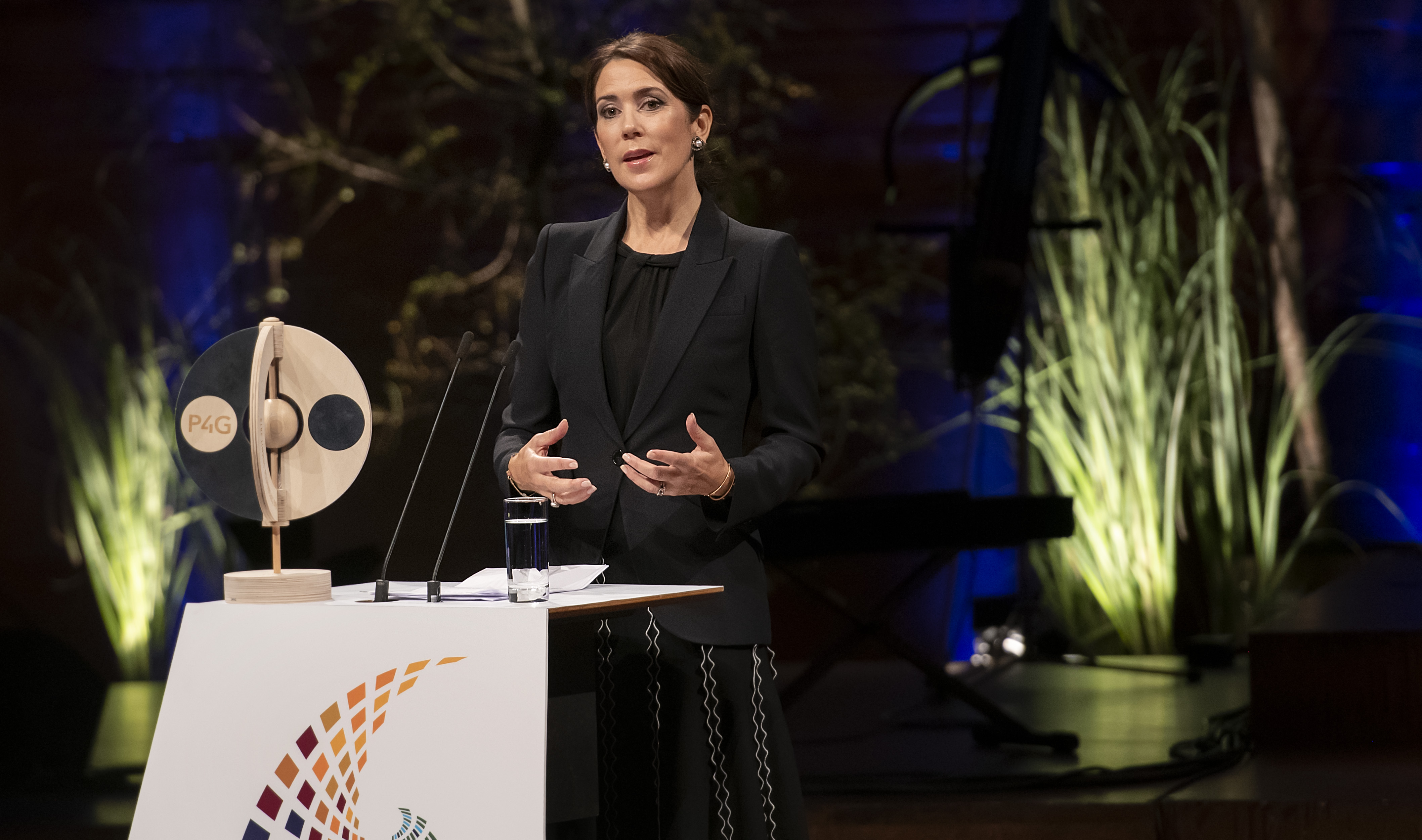
Publication Date
2019-04-16
About
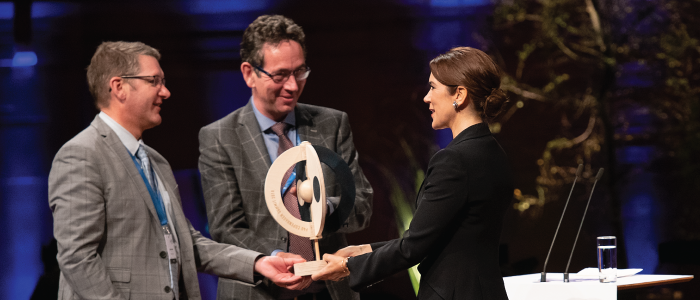
In 2018, the Courtauld Commitment – winner of the 2018 State-of-the-Art Partnership of the Year Award – did not receive a flashy, glass or golden trophy to recognize their excellence. Rather, when WRAP CEO Marcus Gover and Director Richard Swannell joined Her Royal Highness Crown Princess Mary of Denmark on the stage of the Danish Opera House, the Princess passed along a birchwood globe, branded with the P4G swirl. It was a symbolic structure made with sustainable practices and materials – meant to symbolize a world unified through partnership.

Architect Eva Wandel and Designer Rikke Nogel are the creators behind Stories in Structures, a Copenhagen-based studio founded upon the integration of sustainability and beauty. Their work aims to value the entire process of creation – emphasizing how a slow, individualized approach ultimately results in less wasteful and more meaningful final products. In their view, these outcomes promote both better environmental awareness as well as cultural diversity and resilience.
“On the wings that encircle the globe we wanted to tell the story of the P4G mission – about partnering for green growth. All together we wanted to make a simple, beautiful form that would symbolize unity and sustainability,” said Rikke. “Using sustainable dyes and locally-sourced birchwood, we believe the design tells a simple and powerful story.”

Wandel added, “For us, the strongest design is often the simplest design – products that tell a clear story through their emphasis on nature and beauty.”
P4G has again partnered with Stories in Structures to design a similar globe for the 2019 State-of-the-Art Partnership of the Year, as well as plaques to be awarded to sector finalists.
P4G Global Hub Shines Spotlight on Collaboration
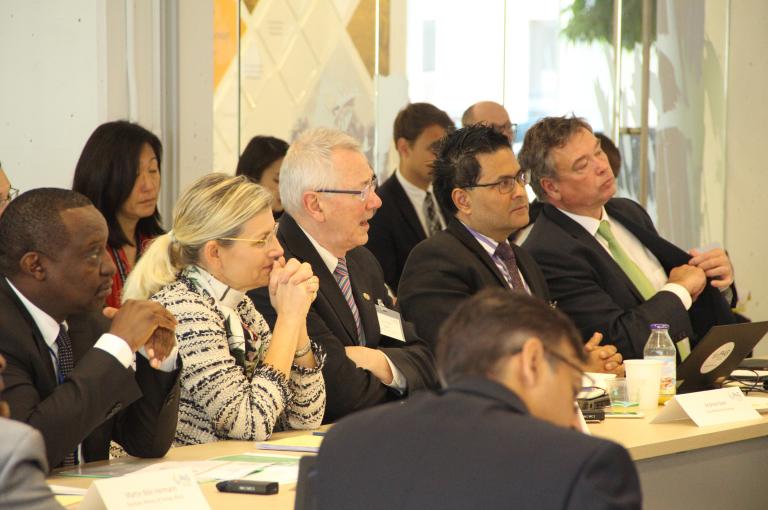
Publication Date
2018-09-10
About
P4G launched its Global Hub last month by welcoming international leaders from government, business and civil society to the Initiative’s inaugural Board Meeting in Washington, DC. Over 40 attendees from P4G's eight partner countries – Denmark, Kenya, Ethiopia, The Republic of Korea, Vietnam, Chile, Colombia and Mexico – and organizational partners C40 Cities, Global Green Growth Institute, World Economic Forum and World Resources Institute, joined a discussion that underscored P4G’s mission to support innovative public-private partnerships to advance solutions for food and agriculture, water, energy, healthy cities and the circular economy.
The meeting was co-hosted by P4G Board of Directors co-chair Ulla Tørnæs, Minister of Development Cooperation, Denmark and Andrew Steer, President and CEO of World Resources Institute, which is the managing partner for P4g.
“Wherever I go, whether home or abroad, when I meet businesses, NGOs, heads of states of government, international organizations and civil society, I have encountered nothing but huge interest in and support for P4G,” Tørnæs remarked.
Steer echoed this international and cross-sectoral captivation with P4G by emphasizing its necessity: “In today’s world, the important initiatives that make the biggest differences are actually multi-stakeholder. They involve the public sector, they involve the private sector. What P4G is trying to do, and will succeed in doing, is to identify some of the most exciting ideas out there and support them, elevate them, encourage them, hold them accountable and move them forward.”
Board members from the public sector emphasized how P4G’s network will be essential to delivering results based on what governments around the world are working to make possible. Cabinet Secretary of the National Treasury of Kenya Henry Rotich noted P4G’s foundational role in implementing Kenya’s 5-year sustainable development agenda. Ethiopia's Minister of Environment, Forest and Climate Change Gemedo Dalle Tussie emphasized how collaboration is the only way to achieve any world-wide goals, and thus the “increasing importance of public-private partnerships to help move green growth focus towards shared areas of concern.”
Representing the private sector, Novozymes President and CEO Peder Holk Nielsen expressed that “the SDGs are an inventory of business opportunities,” crystallizing the fundamental relationship between innovation, development and growth. Nielsen continued with his vision for P4G to occupy this area of crossover – and look to “spark interest, grow businesses, create jobs and support the SDG agenda.”
From civil society, C40 Cities Executive Director Mark Watts remarked, “While we’re focused on getting political commitment, political commitment alone cannot deliver the scale and pace of change that’s necessary to tackle the sustainable development goals. Above all else, we’re going to need public-private partnerships to deliver the projects that governments are now making possible. And that’s what I think P4G really uniquely offers as an opportunity.”
Each speaker, from their perspectives at the public, private and organizational levels, shared their understanding that the organizations and governments they represent cannot pursue pervasive success without the buy-in, trust and thought leadership of those on adjacent levels.
In Chile and Colombia, the SDGs are Driving the Future
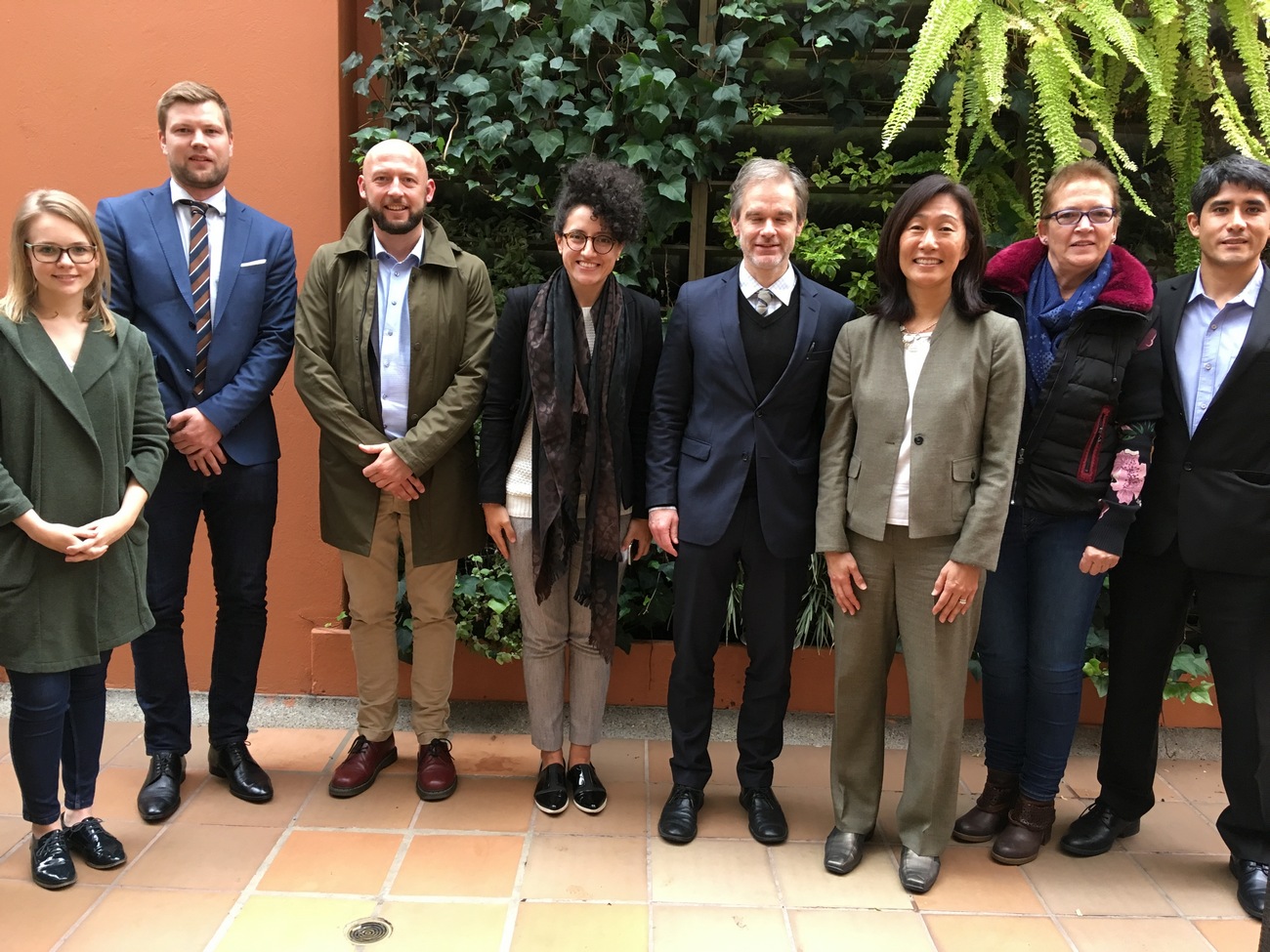
About
P4G presence in South America is anchored with country partnerships in Chile and Colombia—two countries with a combined population of more than 66 million, two mega cities in Santiago and Bogotá and an increased focus on sustainable development to drive their economic growth.
In Chile, P4G’s leadership team recently met with Ministries of Environment, Transport and Energy to begin partnership facilitation and learn about the nation’s plans towards a green growth future.
FAST FACTS
CHILE
Population 18 million
Largest City Santiago (5 million)
Annual GDP 4.2%
GDP USD $247 billion
COLOMBIA
Population 48.6 Million
Largest City Bogota (8 million)
Annual GDP 2.2%
GDP USD $282.5 billion
The country’s Climate Change and Sustainability Agency (ASCC), in collaboration with many of the agencies with which P4G met, aims to materialize significant changes across the country and in both the private and public sectors to promote transformation towards a low carbon economy, reduce greenhouse gas emissions, urge more efficient resource consumption, and lower pollution.
Each of Chile’s objectives is informed by the UN Sustainable Development Goals for 2030 (SDGs), and thus brings the country into a larger global network of green growth trailblazers.
Consequently, the Chilean government stepped forward as a strong incubator of P4G partnerships. The Ministries recognized the SDG areas of the circular economy, energy efficiency and healthy cities as vital partnership categories well in line with the ASCC’s long-term development plan.
“Chile’s partnership with P4G comes at an excellent time – in the year since the ASCC’s formation, the Agency has begun setting the foundation for really transformative action in Chile: and this action is what we see in P4G,” said ASCC Executive Director Juan Ladrón de Guevara González. “P4G partnerships will be vital to strengthening and guiding our continued growth and leadership – and keeping innovation at the forefront of our strategy.”
During meetings held in Colombia, P4G’s newest partner country, the Ministry of Foreign Affairs, the Danish Embassy, and the Global Green Growth Institute (GGGI) all emphasized the country’s alignment with its SDG-driven National Development Plan -- the Todos por un Nuevo País (All for a New Country). In 2015, Colombia President Juan Manuel Santos passed the plan with the goal of pursuing three main pillars: peace, fairness and education. In the years since, the government has backed the plan entirely – garnering buy-in from local governments as well as the private sector.
Colombia’s pursuit of these guiding pillars includes SDG-informed strategies focused around improved infrastructure, social mobility, good governance and transformed landscapes – all as components of economic growth.
P4G’s partnership with Colombia will aim to work within these strategies to further emphasize the public-private overlap inherent in the National Development Plan, and to support existing partnerships already innovating within this space.
“The global coalition that P4G brings to the table will be an outstanding resource for encouraging Colombia’s SDG dialogue both publicly and in the private sector,” Gabriela Gutierrez, Second Secretary at the Ministry of Foreign Affairs of Colombia remarked. “While we are already excited about how our National Development Plan recognizes improved peace, fairness and education as both public and private responsibilities, P4G will help us recognize innovative solutions and learn from global best practices in pursuit of even greater success.”
“P4G looks forward to working alongside both governments as they use the SDGs to guide innovation across sectors as well as forward-thinking policies for a sustainable, inclusive future,” commented Leila Surratt, P4G Head of Strategy and Engagement, following the trip’s conclusion.
P4G Global Director Ian De Cruz added, “Both countries’ aims articulate exactly the intersection that P4G occupies – we’ll look forward to working with Chile and Colombia as green growth leaders for the entire region.”
